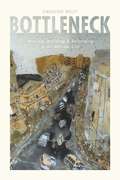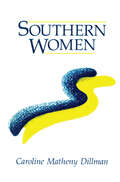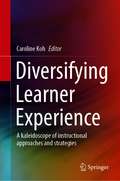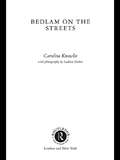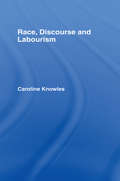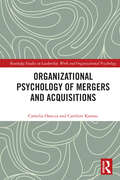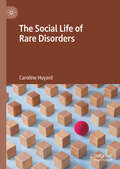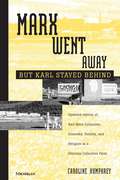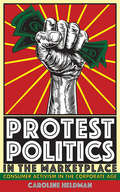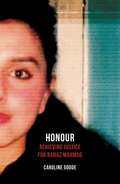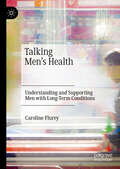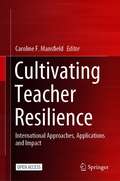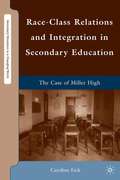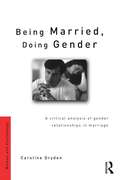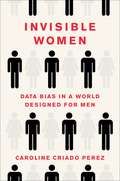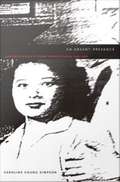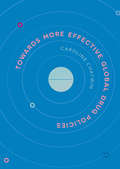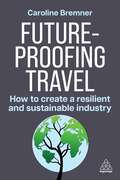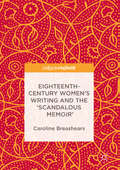- Table View
- List View
Bottleneck: Moving, Building, and Belonging in an African City
by Caroline MellyIn Bottleneck, anthropologist Caroline Melly uses the problem of traffic bottlenecks to launch a wide-ranging study of mobility in contemporary urban Senegal—a concept that she argues is central to both citizens' and the state's visions of a successful future. Melly opens with an account of the generation of urban men who came of age on the heels of the era of structural adjustment, a diverse cohort with great dreams of building, moving, and belonging, but frustratingly few opportunities to do so. From there, she moves to a close study of taxi drivers and state workers, and shows how bottlenecks—physical and institutional—affect both. The third section of the book covers a seemingly stalled state effort to solve housing problems by building large numbers of concrete houses, while the fourth takes up the thousands of migrants who attempt, sometimes with tragic results, to cross the Mediterranean on rickety boats in search of new opportunities. The resulting book offers a remarkable portrait of contemporary Senegal and a means of theorizing mobility and its impossibilities far beyond the African continent.
Southern Women
by Caroline M. DillmanFirst published in 1988. Routledge is an imprint of Taylor & Francis, an informa company.
Beratung als pädagogische Herausforderung in der Außerschulischen Jugendbildung: Eine Analyse am Beispiel des Freiwilligen Sozialen Jahres
by Caroline KruseBeratung in jugendpädagogischen Handlungsfeldern spielt in der Disziplin Erwachsenenbildung/ Außerschulische Jugendbildung (EB/AJB) eine weitestgehend vernachlässigte Rolle. Insbesondere vor dem Hintergrund des jugendtheoretischen Konsenses über eine Zunahme des Beratungsbedarfs von jungen Menschen beansprucht die Studie von Caroline Kruse, einen professionsorientierten Beitrag zur Profilierung von Beratung in der AJB zu leisten.Das im Rahmen ihrer Untersuchungen aufgenommene empirische Bild der Beratungspraxis im Freiwilligen Sozialen Jahr (FSJ) zeigt: Jugendbildungsreferent*innen werden vermehrt mit beraterischen Anforderungen konfrontiert und aus berufspraktischer Perspektive erfährt Beratung in diesem Handlungsfeld einen deutlichen Bedeutungszuwachs. Die Ergebnisse belegen weiter, dass das FSJ besondere förderliche Rahmenbedingungen aufweist, um auf die (zugenommene) Beratungsbedürftigkeit reagieren zu können. Gleichzeitig fehlt es an institutionellen Anerkennungs- und Unterstützungsformen. Beratung wird damit weitestgehend der individuellen Bereitschaft und des selbst zu verantwortenden Wissens und Könnens der Jugendbildungsreferent*innen überlassen.
Diversifying Learner Experience: A kaleidoscope of instructional approaches and strategies
by Caroline KohThis book brings together strategies and innovations that educators from diverse educational contexts have conceptualized and implemented to cater to differences in academic ability, as well as in other domains such as psychosocial contexts and developmental needs. The emergence of IT and new technologies have altered the educational landscape and opened a multitude of opportunities for diverse modes of instruction catering to diverse student populations.The book addresses the gap in the literature with evidence-based reports of innovative strategies and approaches that are grounded in educational research. It identifies student differences in terms of academic ability and also, with regard to their cultural and social background, their developmental and psycho-emotional needs. It examines how new technologies are used in instructional approaches and how these innovative strategies diversify learner experiences. The book is a valuable resource to practitioners, researchers and educational administrators.
Bedlam on the Streets
by Caroline KnowlesWhat happens when the mad are let out of the asylum and there is nowhere for them to go?This hard-hitting and controversial new book traces the terms on which the mad occupy the city's streets, homeless shelters, shopping centres and fast food outlets. This social geography of madness is situated within the broader parameters of systems of social welfare and globalization, arguing that the 'community mental health care' system is actually a system of neglect.Bedlam on the Streets is a richly textured ethnography combining stark photographic images of people and places with an examination of city space and the voices of those that we label "mad".
Race, Discourse and Labourism (International Library of Sociology)
by Caroline KnowlesRace, Discourse and Labourism argues that the commonwealth of socialism is founded upon a well-concealed history of brutality and repression. Caroline Knowles details the historical conditions of the emergence of race through Labour's dealings with Indian independence negotiations and anti-semitism in the thirties, and the effects of this on the conceptions of black citizenship, multi-racialism and black representation in labour politics.
Serious Money: Walking Plutocratic London
by Caroline Knowles'A latter-day Canterbury Tales ... Serious Money has a serious mission' The Times'Eye-opening ... part guide, part indictment of a yawning wealth gap' Misha Glenny, Financial TimesLondon is a plutocrat's paradise, with more resident billionaires than New York, Hong Kong or Moscow. Far from trickling down, their wealth is burning up the environment and swallowing up the city. But what do we really know about London's super rich, and the lives they lead?To find out more about this secretive elite, sociologist Caroline Knowles walks the streets of London from the City to suburban Surrey. Her walks reveal how the wealthy shape the capital in their image, creating a new world of gated communities and luxury developments. Along the way we meet a wide and wickedly entertaining cast of millionaires, billionaires and those who serve them: bankers, tech tycoons, Conservative party donors, butlers, bodyguards, divorce lawyers and many more.By turns jaw-dropping, enraging and enlightening, Serious Money explodes the fiction that wealth is a condition to aspire to, revealing the isolation and paranoia which accompany it when the plutocrat's recompense - a life of unlimited luxury - ultimately proves hollow. It is a powerful reminder that it is not just the super-rich who get to make the city: we make it too, and could demand something different. Because serious money is good for no one - not even the rich.'An eye-opening, deeply disturbing, fast-moving journey through the lives, homes and affairs of the filthy rich of London' Danny Dorling, author of All That Is Solid'A wonderful and vital account of a city ruled by, and for, extreme wealth' Anna Minton, author of Big Capital
Organizational Psychology of Mergers and Acquisitions: Examining Leadership and Employee Perspectives (Routledge Studies in Leadership, Work and Organizational Psychology)
by Caroline Kamau Camelia OanceaOrganizational Psychology of Mergers and Acquisitions provides a comprehensive perspective that helps you understand, empathise and protect the wellbeing of employees who experience mergers and acquisitions. This book gives a state-of-the-art review that crosses different subjects within psychology including psychobiology, neuroscience, social psychology, interpersonal relationships, and organizational psychology. This book discusses why many employees think of mergers or acquisitions as scary or threatening events, why negative emotions are prevalent, their psychobiological impact and how to assess employees’ emotional responses using a new toolkit. It helps readers learn what counts as good leadership, considering the role of charisma, personality, context and information processing abilities. This book includes the issue of organizational learning, and the relevance of occupational health and safety to due diligence about mergers and acquisitions through case studies about organizations sued for cancer or cancer-related mortality after a merger or acquisition. This book is mandatory reading for students, academics, and practitioners working with organizations experiencing a merger or an acquisition such as consultants, human resource professionals, psychologists, occupational health professionals, and employees involved in strategy, management, or people development.
The Social Life of Rare Disorders
by Caroline HuyardThis book is the first comprehensive study of rare disorders from a historical, political, and social perspective. It is estimated that around 300 million people worldwide live with a rare disorder today. What do patients and associations concerned by one of the 7,000 known rare diseases have in common, and what does rarity mean to them? How did rare disorders become a mainstream category in public health policy? To answer these questions, Caroline Huyard traces the history, over more than 50 years, of medical treatments for one particular disease, and that of the orphan drug status in the United States and in Europe. The book shows that public authorities had a much greater role than biomedicine in turning rare disorders into a public health problem. A comparison of patients' experiences of 6 rare diseases as well as the activities of 8 associations in France underlines the importance of isolation and care for patients on the one hand, and the role of stakeholders’ participation for associations on the other hand. This book is essential reading for researchers and students interested in contemporary healthcare systems and topics related to public policies on emerging issues, the industrialisation and regulation of medicine, the concept of care, and the governance of patient organisations.
Marx Went Away - But Karl Stayed Behind: Economy, Society and Religion in a Siberian Collective Farm
by Caroline HumphreyWhen it appeared in 1983, Caroline Humphrey's Karl Marx Collective was the first detailed study of the Soviet collective farm system. Through careful ethnographic work on two collective farms operated in Buryat communities in Siberia, the author presented an absorbing--if dispiriting--account of the actual functioning of a planned economy at the local level. Now this classic work is back in print in a revised edition that adds new material from the author's most recent research in the former Soviet Union. In two new chapters she documents what has happened to the two farms in the collapsing Russian economy. She finds that collective farms are still the dominant agricultural forms, not out of nostalgic sentiment or loyalty to the Soviet ideal, but from economic and political necessity. Today the collectives are based on households and small groups coming together out of choice. There have been important resurgences in "traditional" thinking about kinship, genealogy, shamanism and mountain cults; and yet all of this is newly formed by its attempt to deal with post-Soviet realities.
Until We Are Strong Together: Women Writers In The Tenderloin (Language And Literacy Ser.)
by Caroline HellerIn her extraordinary book about the members of the Tenderloin Women Writers Workshop, Caroline Heller witnesses the power of literacy in the lives of these women who gathered weekly in one of San Francisco's roughest neighborhoods, to share their writing and life experiences. In telling their stories as she came to know them during her three years of attendance. Heller brings the group to life and explores the functions the workshop served for its participant, functions that were social, political, and deeply educational. Her eloquent narrative contributes a fresh conception of critical literacy and liberation education, drawing on the words and perceptions of some of those outside the mainstream of American life, enriching our understanding of how we might more effectively learn in community with one anothe, and how to connect writing to real life, to our neighborhood, and to social justice and social change.
Protest Politics in the Marketplace: Consumer Activism in the Corporate Age
by Caroline HeldmanProtest Politics in the Marketplace examines how social media has revolutionized the use and effectiveness of consumer activism. In her groundbreaking book, Caroline Heldman emphasizes that consumer activism is a democratizing force that improves political participation, self-governance, and the accountability of corporations and the government. She also investigates the use of these tactics by conservatives.Heldman analyzes the democratic implications of boycotting, socially responsible investing, social media campaigns, and direct consumer actions, highlighting the ways in which such consumer activism serves as a countervailing force against corporate power in politics. In Protest Politics in the Marketplace, she blends democratic theory with data, historical analysis, and coverage of consumer campaigns for civil rights, environmental conservation, animal rights, gender justice, LGBT rights, and other causes. Using an inter-disciplinary approach applicable to political theorists and sociologists, Americanists, and scholars of business, the environment, and social movements, Heldman considers activism in the marketplace from the Boston Tea Party to the present. In doing so, she provides readers with a clearer understanding of the new, permanent environment of consumer activism in which they operate.
Von der Gasse zum öffentlichen Raum: Praktiken und Rationalisierungen in der schweizerischen Gassenarbeit (Sozialraumforschung und Sozialraumarbeit #27)
by Caroline HaagZu Beginn der 2000er-Jahre wurde für die sSchweizerische Gassenarbeit eine Phase der Neuorientierung diagnostiziert, die aber bislang kaum analytisch reflektiert wurde. War Gassenarbeit früher stark an einer parteilichen Ausrichtung und der Lebenswelt ihrer Zielgruppen – der Gasse – orientiert, wird heute vor allem öffentlicher Raum als Bezugspunkt gesetzt. Wie sich die sozialarbeiterische Praxis im Anschluss an die Phase der Neuorientierung gestaltet, bleibt bislang ebenso offen wie der Stellenwert von öffentlichem Raum im Kontext dieser Praxis. Anhand zweier kontrastierender Teams wird deutlich, dass sich Gassenarbeit mittlerweile zwischen Bewirtschaftung des öffentlichen Raums und Lobbyarbeit in der Stadtentwicklung bewegt.
Honour: Achieving Justice for Banaz Mahmod
by Caroline GoodeWhen Rahmat Sulemani reported his girlfriend Banaz missing, it quickly became clear to DCI Caroline Goode that something was very wrong. In fact, Banaz had contacted her local police station multiple times before, even listing the names of the men she expected to murder her in a so-called 'honour' killing. Her parents didn't seem worried, but Banaz had already accused them of being part of the plot.DCI Goode's team took on the investigation before they even had proof that a murder had taken place. What emerged was a shocking story of betrayal and a community-wide web of lies, which would take the team from suburban south London to the mountain ranges of Kurdistan, making covert recordings and piecing together cell phone data to finally bring the killers to justice.
Talking Men's Health: Understanding and Supporting Men with Long-Term Conditions
by Caroline FlureyThis book explores male health psychology in relation to chronic health conditions. Using data from men with rheumatic diseases as a starting point, this book draws on the wider literature to focus on how men talk about different aspects of living with long-term health issues. This includes how men discuss the impact of chronic illness on their sense of control and self-reliance, masculine identity, body image, mental health, sex and intimacy, and for those living with a life-limiting condition how they discuss facing their mortality. It also covers how men self-manage and what influences their help-seeking behaviours. Whilst men are often branded as ‘hard to reach’, the author argues that when given permission and provided with the right environment, men will talk about their health. This book takes the stance men are under-served by health services and includes suggestions for developing support services for health and mental health that meet men’s needs and preferences. Focussing on the experiences and support needs of men with long-term conditions, this is an ideal reading for clinicians, healthcare professionals, and practitioners working with men with long-term conditions, as well as early career researchers and students interested in male psychology, men’s health, and gender and society.
Cultivating Teacher Resilience: International Approaches, Applications and Impact
by Caroline F. MansfieldThis open access book follows the development of the Building Resilience in Teacher Education (BRiTE) project across Australia and internationally. Drawing on the success of this project and the related research collaborations that have since emerged, it highlights the importance of cultivating resilience at various stages of teachers’ careers.Divided into three sections, the book includes conceptual, empirical and applied chapters, designed to introduce readers to the field of research, provide empirical evidence and showcase innovative applications. The respective chapters illustrate the ways in which teacher resilience can be enhanced in a variety of contexts, and address specific learning activities, case studies, resources and strategies, student feedback and applied outcomes. They also consider future directions including cross-cultural applications and the use of technologies such as augmented reality. The book will appeal to researchers, teacher educators and teachers, as well as those interested in supporting the cultivation and ongoing development of professional resilience for pre-service and practicing teachers.
Race-Class Relations and Integration in Secondary Education
by Caroline EickEick explores the history of a comprehensive high school from the world views of its assorted student body, confronting issues of race, ethnicity, class, gender, nationality, and religion. Her case study examines the continuities and differences in student relationships over five decades.
Being Married, Doing Gender: A Critical Analysis of Gender Relationships in Marriage (Women and Psychology)
by Caroline DrydenIn one of the first psychological studies of women in heterosexual relationships, Caroline Dryden examines the social context of their experiences and emotional struggles. Unlike the developmental literature in which women are studied only as mothers, or the clinical literature which has little theoretical basis, Being Married, Doing Gender places case study material in the context of the power balance between women and men. Caroline Dryden finds that there are contradictions between stereotypical gender roles and the maintenance of an equal partnership that can cause problems for both women and men. Being Married, Doing Gender will be valuable to students studying psychology or gender and women's studies and to marriage guidance counsellors and psychotherapists.
Invisible Women: Data Bias in a World Designed for Men
by Caroline Criado PerezData is fundamental to the modern world. From economic development, to healthcare, to education and public policy, we rely on numbers to allocate resources and make crucial decisions. But because so much data fails to take into account gender, because it treats men as the default and women as atypical, bias and discrimination are baked into our systems. And women pay tremendous costs for this bias, in time, money, and often with their lives. Celebrated feminist advocate Caroline Criado Perez investigates the shocking root cause of gender inequality and research in Invisible Women, diving into women’s lives at home, the workplace, the public square, the doctor’s office, and more. Built on hundreds of studies in the US, the UK, and around the world, and written with energy, wit, and sparkling intelligence, this is a groundbreaking, unforgettable exposé that will change the way you look at the world.
An Absent Presence: Japanese Americans in Postwar American Culture, 1945-1960
by Caroline Chung SimpsonThere have been many studies on the forced relocation and internment of nearly 120,000 Japanese Americans during World War II. But An Absent Presence is the first to focus on how popular representations of this unparalleled episode in U. S. history affected the formation of Cold War culture. Caroline Chung Simpson shows how the portrayal of this economic and social disenfranchisement haunted--and even shaped--the expression of American race relations and national identity throughout the middle of the twentieth century. Simpson argues that when popular journals or social theorists engaged the topic of Japanese American history or identity in the Cold War era they did so in a manner that tended to efface or diminish the complexity of their political and historical experience. As a result, the shadowy figuration of Japanese American identity often took on the semblance of an "absent presence. " Individual chapters feature such topics as the case of the alleged Tokyo Rose, the Hiroshima Maidens Project, and Japanese war brides. Drawing on issues of race, gender, and nation, Simpson connects the internment episode to broader themes of postwar American culture, including the atomic bomb, McCarthyism, the crises of racial integration, and the anxiety over middle-class gender roles. By recapturing and reexamining these vital flashpoints in the projection of Japanese American identity, Simpson fills a critical and historical void in a number of fields including Asian American studies, American studies, and Cold War history.
Hokkien Theatre Across The Seas: A Socio-Cultural Study
by Caroline ChiaThis book adopts a refreshing approach by examining Hokkien theatre in a region connected by maritime networks, notably southern Fujian, Taiwan, Kinmen and Singapore. It considers how regional theatre is shaped by broader socio-cultural and political contexts and the motivation to stay relevant in an era of modernisation and secularisation. Political domains are often marked out by land boundaries, but the sea concept denotes fluidity, allowing theatrical forms to spread across these ‘land-bounded’ societies and share a common language and culture."This is an insightful theatrical study on the web of Chinese cultural networks in southern China and Singapore, and by extension, between China and Southeast Asia in the twentieth century and beyond. Using diverse sources in multiple languages and extensive field ethnography, this is a ground-breaking study which is both didactic and inspiring."- Lee Tong Soon, author of Chinese Street Opera in Singapore (University of Illinois, 2009)."Focusing on Hokkien theatre, this book offers new insights into how Chinese performing art responds to geographical, temporal, and social changes. Historical sources in different languages are widely used to give access to the cultural characteristics of Hokkien theatre, offering valuable ethnographic reports on the contemporary practices of Hokkien theatre in Taiwan, Kinmen, and Singapore. The book comments on the changing ritualistic significance of Hokkien theatre, and help us understand how societies remember the past of a performing tradition, and shape its present."- Luo Ai Mei, Co-Editor of A Preliminary Survey of the Cantonese Eight Song Cycles in South China: History and Sources (2016)
Towards More Effective Global Drug Policies
by Caroline ChatwinThis book examines the topical issue of global drug policy and outlines five steps that could be taken to improve its effectiveness. A public criminology approach is applied to explore not only what could be done, but also why it matters and how it could be achieved. It argues that more effective global drug policies require an acknowledgement of the failure of a war on drugs approach and the harms it has caused. Instead, strategies that reduce drug related harm should be prioritised. An innovative and diverse range of approaches should be developed that are underpinned by evaluation and dissemination of results. Finally, the horizons of the drug policy debate should be broadened. In line with the central aims of public criminology, this book provides an accessible contribution to global drug policy debates that links theory and practice and which will have appeal to a wide range of audiences.
Accounting for Affection
by Caroline CastiglioneAccounting for Affection examines the multifaceted nature of early modern motherhood by focusing on the ideas and strategies of Roman aristocratic mothers during familial conflict. Illuminating new approaches to the maternal and the familial employed by such women, it demonstrates how interventions gained increasing favor in early modern Rome.
Future-proofing Travel: How to Create a Resilient and Sustainable Industry
by Caroline BremnerEvolving traveller expectations, pressures to reduce emissions and a need to preserve popular destinations from over-tourism and climate change are creating untold disruption in the travel industry. The industry cannot continue to grow unchecked and wholesale transformation is required.Future-proofing Travel considers current travel trends in consumer expectations for greener and more experiential travel alongside the demands from local communities and industry-led initiatives to meet government pledges of lower emissions. It explores how business leaders in tourism and hospitality services must adapt their offerings to remain relevant in a competitive environment where sustainability and technology are no longer nice-to-haves. Explore data-driven and holistic solutions for travel industry professionals to transform their businesses to be more purposeful and sustainable with this book.While there is no one pathway to success, Future-proofing Travel shows how travel companies and destinations are currently adapting their practices to be more impact conscious while also elevating the traveller experience. Using real-world examples from leading brands such as Airbnb, Marriott, TUI and Intrepid Travel, this book maps out how travel brands and destinations can accelerate their positive actions through digitalization and green innovation to regenerate local communities, retain consumer loyalty and increase long-term profits sustainably into the future.
Eighteenth-Century Women's Writing and the 'Scandalous Memoir'
by Caroline BreashearsThis book contributes to the literary history of eighteenth-century women's life writings, particularly those labeled "scandalous memoirs. " It examines how the evolution of this subgenre was shaped partially by several innovative memoirs that have received only modest critical attention. Breashears argues that Madame de La Touche's Apologie and her friend Lady Vane's Memoirs contributed to the crystallization of this sub-genre at mid-century, and that Lady Vane's collaboration with Tobias Smollett in The Adventures of Peregrine Pickle resulted in a brilliant experiment in the relationship between gender and genre. It demonstrates that the Memoirs of Catherine Jemmat incorporated influential new strategies for self-justification in response to changing kinship priorities, and that Margaret Coghlan's Memoirs introduced revolutionary themes that created a hybrid: the political scandalous memoir. This book will therefore appeal to scholars interested in life writing, women's history, genre theory, and eighteenth-century British literature.
